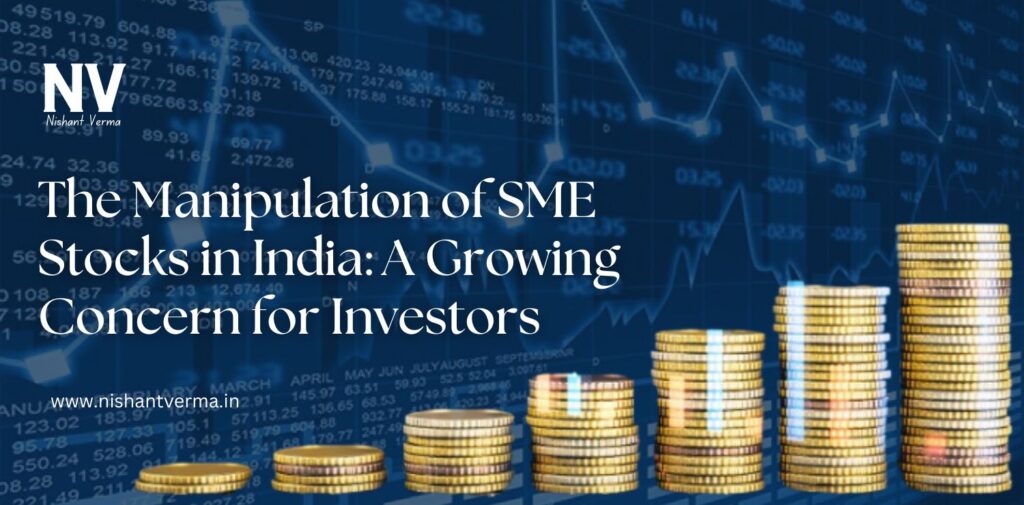In recent years, there has been a significant increase in the participation of retail investors in the Indian stock market, especially in the small and medium enterprise (SME) segment. However, with this rise, there has also been growing concern among investors regarding the integrity of these stocks. Many investors believe that a large portion of SME stocks are manipulated, leading to distrust and fear in the market. In this article, we will explore whether there is truth to this belief, the reasons behind such manipulation, the impact on investors, and steps that can be taken to safeguard investments in SME stocks.
Understanding SME Stocks in India
Small and Medium Enterprises (SMEs) are crucial to the Indian economy. They contribute significantly to employment, manufacturing output, and exports. Recognizing their importance, the Indian government and regulatory bodies like the Securities and Exchange Board of India (SEBI) have taken steps to create a conducive environment for SMEs to raise capital. One such initiative is the SME exchange, a platform specifically designed for SMEs to list their shares and raise funds from the public.

SME stocks refer to the shares of companies listed on the SME exchanges in India, such as the BSE SME and NSE Emerge. These stocks are usually of companies with smaller market capitalizations, which means they are in the early stages of growth and have less liquidity compared to large-cap stocks. While investing in SME stocks can offer high returns due to the growth potential of these companies, they also come with higher risks. One of the most significant risks associated with SME stocks is the possibility of price manipulation.
Why Are SME Stocks Susceptible to Manipulation?
Several factors make SME stocks particularly vulnerable to manipulation. Understanding these factors is key to grasping why so many investors believe that a large proportion of SME stocks are manipulated.
Low Liquidity: Liquidity refers to how easily a stock can be bought or sold without affecting its price. SME stocks generally have lower liquidity because they are not as widely traded as large-cap stocks. This low liquidity makes it easier for manipulators to influence the stock price by placing large buy or sell orders. A small amount of trading activity can significantly move the price, which can be exploited by manipulators.
Limited Information: Unlike large companies that are closely followed by analysts and the media, SMEs often operate under the radar. There is limited information available to the public, and these companies may not have the resources to maintain transparent communication with investors. This lack of information can create an environment where rumors and false information can easily spread, leading to price manipulation.
Lack of Regulatory Oversight: Although SME exchanges are regulated by SEBI, the regulatory oversight on these platforms may not be as stringent as on the main exchanges. The relatively new nature of SME exchanges and the smaller size of the companies listed on them might result in fewer resources being allocated for monitoring and enforcing regulations. This gap in oversight can be exploited by manipulators.
Promoter Control: In many SMEs, the promoters (the individuals or entities who started the company) hold a significant percentage of the company’s shares. This concentrated ownership gives promoters the power to influence the stock price through coordinated buying or selling. In some cases, promoters may collude with operators to artificially inflate or deflate the stock price for personal gain.
How Does Stock Manipulation Work?
Stock manipulation involves artificially inflating or deflating the price of a stock to create a false impression of the stock’s value. This is usually done through tactics such as “pump and dump” schemes or spreading false information. Here’s how these tactics typically work:
Pump and Dump: In a pump-and-dump scheme, manipulators first buy a large number of shares of an SME stock at a low price. They then start “pumping” the stock by spreading positive rumors or misleading information about the company’s prospects. This creates a buying frenzy among unsuspecting investors, driving up the stock price. Once the price has been inflated to a desired level, the manipulators “dump” their shares by selling them at the inflated price, making a profit. The sudden selling pressure causes the stock price to crash, leaving retail investors with significant losses.

Bear Raids: In contrast to pump-and-dump, bear raids involve artificially driving down the price of a stock. Manipulators may spread negative rumors or misleading information to create panic among investors, causing them to sell their shares. The manipulators can then buy the stock at a lower price, profiting from the decline. Once they have accumulated enough shares, they may reverse the trend by spreading positive news, causing the stock price to recover, allowing them to sell at a higher price.
Circular Trading: Circular trading involves a group of manipulators buying and selling the same stock among themselves at progressively higher prices. This creates the illusion of increased trading volume and rising prices, attracting unsuspecting investors to buy the stock. Once the manipulators have inflated the price sufficiently, they sell their shares to the public at the inflated price, leaving retail investors with losses when the price eventually collapses.
Impact on Investors and the Market
The manipulation of SME stocks has severe consequences for retail investors and the overall market. When stocks are manipulated, it distorts the true value of the company, leading to misleading signals for investors. Those who fall prey to such schemes often suffer significant financial losses, eroding their confidence in the market.
Loss of Investor Confidence: Repeated instances of stock manipulation can lead to a loss of confidence among investors, particularly retail investors who may not have the resources to conduct thorough research. When investors perceive the market as being unfair or rigged, they may choose to withdraw their investments or refrain from participating altogether. This can lead to reduced liquidity in the market, making it even more susceptible to manipulation.
Market Inefficiency: A well-functioning stock market is supposed to reflect the true value of companies based on their performance and growth prospects. However, when stocks are manipulated, it leads to market inefficiency, where prices do not accurately reflect the underlying value of the companies. This distorts the allocation of capital, leading to resources being directed toward less deserving companies, while genuinely valuable companies may struggle to raise funds.
Legal and Financial Repercussions: Investors who suffer losses due to stock manipulation may seek legal recourse, leading to lawsuits and regulatory investigations. For the companies involved, this can result in financial penalties, reputational damage, and even delisting from the exchange. For the broader market, such scandals can lead to increased regulatory scrutiny and the introduction of stricter regulations, which can affect all market participants.
Safeguarding Investments in SME Stocks
Given the risks associated with SME stocks, it is essential for investors to take steps to protect their investments. Here are some strategies that can help investors safeguard their portfolios:
Conduct Thorough Research: Before investing in SME stocks, investors should conduct thorough research on the company’s financials, business model, management, and growth prospects. Relying solely on tips or rumors can be dangerous. Investors should also look for red flags, such as sudden spikes in stock price without any fundamental reason, low trading volumes, and high promoter holdings.

Diversify Your Portfolio: Diversification is a key strategy in managing investment risk. By spreading investments across multiple stocks and sectors, investors can reduce the impact of any single stock’s poor performance on their overall portfolio. This is especially important when investing in high-risk segments like SME stocks.
Stay Informed: Keeping up with market news and developments is crucial for any investor. By staying informed, investors can better understand the factors affecting their investments and make more informed decisions. Subscribing to reputable financial news sources and following updates from regulatory bodies like SEBI can help investors stay ahead of potential risks.
Seek Professional Advice: For investors who are not confident in their ability to analyze stocks, seeking professional advice from financial advisors or portfolio managers can be a wise decision. These professionals can provide valuable insights and help investors build a balanced portfolio that aligns with their risk tolerance and investment goals.
Conclusion
The belief that 9 out of 10 SME stocks in India are manipulated may be an exaggeration, but it is not entirely unfounded. The SME segment is indeed more susceptible to manipulation due to factors like low liquidity, limited information, and concentrated ownership. However, with careful research, diversification, and vigilance, investors can still find opportunities in this high-risk, high-reward segment.
Investors must approach SME stocks with caution, being aware of the risks involved and taking steps to mitigate them. By doing so, they can protect their investments and contribute to a healthier, more transparent market environment. While regulatory bodies like SEBI continue to work towards improving oversight and reducing manipulation, the responsibility ultimately lies with investors to make informed decisions and avoid falling prey to manipulative schemes.




